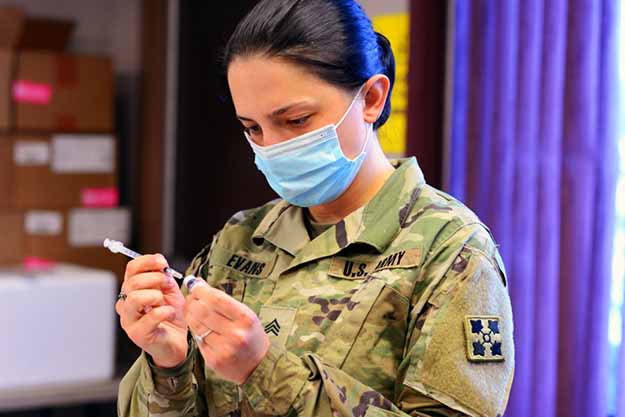The good news for the Defense Department is that the vast majority of military members have been vaccinated for COVID, so there won't be a mass exodus of troops come December's deadline.
By all recent indications, roughly 90 to 95% of the force has complied with the mandate, with those numbers expected to rise by December.
But what is the state of the civilian workforce? And how will visitors to the base be treated?
An Oct. 18 memorandum from the Pentagon stated civilian workers must comply by Nov. 22 or be ultimately fired.
Latest numbers from the DoD show 42% of the civilian workforce is fully vaccinated, however, officials said those numbers are unverified because civilians haven't reported their status or they received shots outside the DoD's medical system.
Those DoD civilians who refuse to get vaccinated will first go through "progressive enforcement actions," the first being a five-day counseling and education period.
If an employee still decides not get vaccinated, they will be suspended without pay for less than 14 days. If the refusal continues, the DoD will terminate the employee for "failing to follow a direct order," with exceptions due for medical conditions or religious reasons.
Defense contractors are also mandated to be vaccinated, or show up to their worksite with a negative COVID test and be subject to weekly screening.
The same holds true for visitors to all military bases and DoD buildings. If not vaccinated, they must show up with a negative test from the last 72 hours, or be subject to onsite testing if that is available. If the testing is not available, they will be refused entry. The order does not apply to those visiting infrequently such as taxi drivers or delivery personnel.
How many civilian workers on base will leave for not getting a shot?
Clues might be available here in Washington state. Last week, 1,900 government workers were fired from the state payroll for refusing the inoculation against COVID. That was roughly 3% of workers covered by the mandate, while another 4.6% plan to retire or get vaccinated.
If you haven't heard, or remember, the military has been at these crossroads before in its history.
General George Washington could not see the virus that was ravaging his Army in 1777. Calling smallpox "the most dangerous enemy," and regarding the virus a greater threat than British bayonets, he ordered Dr. William Shippen, Jr., the director-general of the Hospitals of the Continental Army, to inoculate the Colonial Army.
The majority of Washington's soldiers obeyed the order; however, there were those who rejected it. But in a relatively short period of time, smallpox was contained and the health and welfare of the Army was restored.
Moving forward to the end of the 20th century and the beginning of the 21th century, the military found itself confronting the threat of anthrax.
A disease that occurs naturally in herd animals, humans can contract it by eating contaminated meat, handling contaminated animals or animal products, or directly inhaling anthrax germs. If this happens, and if one is not vaccinated, death is a certainty.
By the end of the 20th century, anthrax had been weaponized. In the early 1990s, the Department of Defense began to vaccinate service members, particularly those who served in the 1991 Gulf War. But the threat posed by anthrax persisted, and in 1998 then Secretary of Defense William Cohen ordered all members of the military - active, Guard or Reserve - to receive anti-anthrax shots.
In language that now sounds familiar Cohen said, "Our commanders must know that all, not simply some fraction, of their forces are protected from this biological threat. Soldiers, sailors, airmen, and Marines fight in teams, and they need to know that all team members are protected from anthrax. ... Allowing a voluntary vaccination program is inadequate in the face of this deadly threat."
But not everyone in the military agreed, and social media helped to fuel the disagreement.
"One of the biggest lessons we have learned," said Army Col. Gaston Randolph, director of the Department of Defense's Anthrax Vaccine Immunization Program in 2000, "is that you should never underestimate the power of the Internet to inform and misinform. It used to be that protesters made posters, put on marches, and maybe ran ads in newspapers with limited audiences."
Those days are long past, and Randolph acknowledged this when he added, "Now, they can go worldwide, and in an instant, the information is available to millions."
Resistance to this order attracted widespread press coverage; however, numerous military and civilian officials noted that only a relative handful of service members refused the injections. For those that did, each case was handled separately by the service member's commander. On the whole, the hullabaloo about an anthrax vaccination has faded away.
Not surprisingly, misinformation and fear characterizes much of the current resistance service members have to being vaccinated - just as it did in meeting the smallpox and anthrax threats.
"The vaccine hesitancy mostly spurs health concerns and misinformation found on social media," said Col. Owen Price, the Force Health Protection Officer at Fort Bragg, North Carolina, during a July interview.
In an attempt to address the hesitancy and combat misinformation, Secretary of Defense Lloyd Austin issued a memorandum in August directing mandatory COVID vaccinations using only Food and Drug Administration-approved vaccines for service members.
The Pfizer vaccine has received full FDA approval.
"This is quite literally a matter of life and death for our soldiers, their families and the communities in which we live," said Lt. Gen. R. Scott Dingle, the Army's surgeon general.
The 485,900 soldiers on active duty must be vaccinated by Dec. 15, 2021. The 336,000 National Guard and 189,000 Reserve troops have until June 30, 2022 to be vaccinated.
The Air Force and Space Force has the earliest deadline, Nov. 2.
Service members who have concerns will be counseled and have their worries addressed before any action is taken against them.





Read Comments